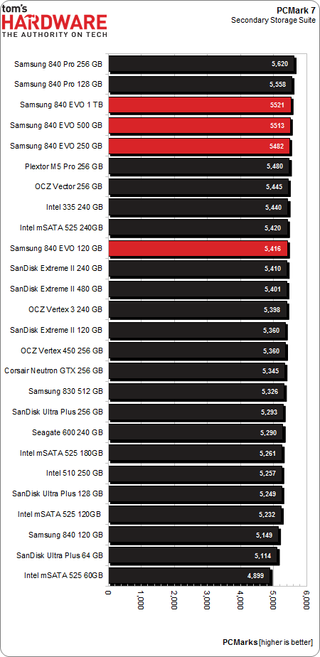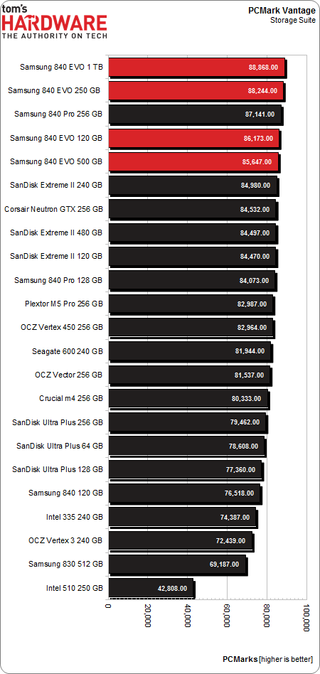Samsung 840 EVO SSD: Tested At 120, 250, 500, And 1000 GB
Last week, Samsung unveiled a successor to its wildly popular 840 at the company's Global SSD Summit in Seoul, South Korea. Stacked with a series of new features and 19 nm, three-bit-per-cell NAND, we benchmark four models and make a recommendation.
Results: PCMark 7 And PCMark Vantage
Futuremark's PCMark 7: Secondary Storage Suite
PCMark 7 uses the same trace-based technology as our Storage Bench v1.0 for its storage suite testing. It employs a geometric mean scoring system to generate a composite, so we end up with PCMarks instead of a megabytes per second. One-thousand points separate the top and bottom, but that encompasses a far larger difference than the score alone indicates.

PCMark 7 is a vast improvement over the older PCMark Vantage, at least for SSD benchmarking. The storage suite is comprised of several small traces. At the end, the geometric mean of those scores is scaled with a number representing the test system's speed. The scores generated are much different from PCMark Vantage, and many manufacturers are predisposed to dislike it for that reason. It's hard to figure out how PCMark 7 "works" because it uses a sliding scale to generate scores. Still, it represents one of the best canned benchmarks for storage, and if nothing else, it helps reinforce the idea that the differences in modern SSD performance don't necessarily amount to a better user experience in average consumer workloads.
Samsung's high-performance flagships plant a flag at the top. From there, we see three different 840 EVO drives. Given what we know about the new drive's read performance and the fact that PCMark 7 is probably a prototypical workload that benefits from Turbo Write, maybe we shouldn't be so surprised.
PCMark 7 is great because it reflects real-world SSD performance differentials. Some dislike the fact that the composite scores are so similar from drive to drive, but it helps illustrate the real world feel among drives, and that means a fast drive and a slow drive aren't as far apart as the other benches might indicate.
Futuremark's PCMark Vantage: Hard Drive Suite
PCMark's Vantage isn't the paragon of SSD testing, mainly just because it's old and wasn't designed for the massive performance solid-state technology enables. Intended to exploit the new features in Windows Vista, Vantage was certainly at the forefront of consumer storage benching at the time. Vantage works by taking the geometric mean of composite storage scores and then scaling them a lot like PCMark 7 does. But in Vantage's case, this scaling is achieved by arbitrarily multiplying the geometric sub-score mean by 214.65. That scaling factor is supposed to represent an average test system of the day (a system that's now close to a decade behind the times). PCMark 7 improves on this by creating a unique system-dependent scaling factor and newer trace technology. Why bother including this metric, then? A lot of folks prefer Vantage in spite of or because of the cartoonish scores and widespread adoption. That, and the fact that most every manufacturer uses the aged benchmark in box specs and reviewer-specific guidelines.
Stay on the Cutting Edge
Join the experts who read Tom's Hardware for the inside track on enthusiast PC tech news — and have for over 25 years. We'll send breaking news and in-depth reviews of CPUs, GPUs, AI, maker hardware and more straight to your inbox.

Current page: Results: PCMark 7 And PCMark Vantage
Prev Page Results: Tom's Hardware Storage Bench, Continued Next Page Results: Robocopy File Copy Performance-
Someone Somewhere Surely it would make sense to compare it to the vanilla SSD840. Also, there's no 840 Pro in the power charts.Reply
While the 1TB drive coming down to ~65c/GB is nice, seeing the 120 GB drives get near there would be nice. Especially since this is meant to be the value king. -
drwho1 I have 2 840 pro 512 GB SSD's (1 on my notebook 1 on my PC)Reply
I got them on a sale on Newegg for around $500 for both of them. :)
A 1TB would be cool if I find it on sale....
or maybe I should try out writing a letter to someone fat in some weird red costume...
-
slomo4sho The performance gap between the 840 Evo and 840 Pro is discouraging for the lower capacity models. I understand that the Pro is the flagship product but I was expecting less of a gap in in the 120GB models since this is a newer generation product and the 840 Pro is still based on the 21nm MLC NAND. However, the 1TB model is is a great choice for mass SSD storage. Lets hope the prices drop below $0.50 per GB soon.Reply -
Someone Somewhere MLC is faster than TLC, and bigger node NAND is usually faster. Only reason to go smaller is price and power.Reply -
SteelCity1981 I wonder if samsung plans on releasing a pro evo series since the regular series evo is to replace the older non pro versions.Reply -
razor512 ripoff, high prices for triple level flash especially at 19mm, the lifespan will likely suck and their shortened warranty represents that.Reply -
master9716 Cost for performance = Very High . ofcourse its not going to perform like a Pro but for the cost im amazed its that much better than the Regular 840.Reply -
J_E_D_70 Glad this review also refutes the perception of low TLC write endurance in normal desktop workloads. Been using a 128GB 840 in a daily-use desktop for eight months now and the endurance counter hasn't decremented at all. I'll have replaced the entire rig long before it wears out.Reply -
JohnnyLucky Interesting review. I think the point to remember is that the 840 EVO is not a high end enthusiast ssd like the 840 Pro. Instead, consider the 840 EVO as a mainstream ssd suitable for most consumer and home office scenarios.Reply
Most Popular

